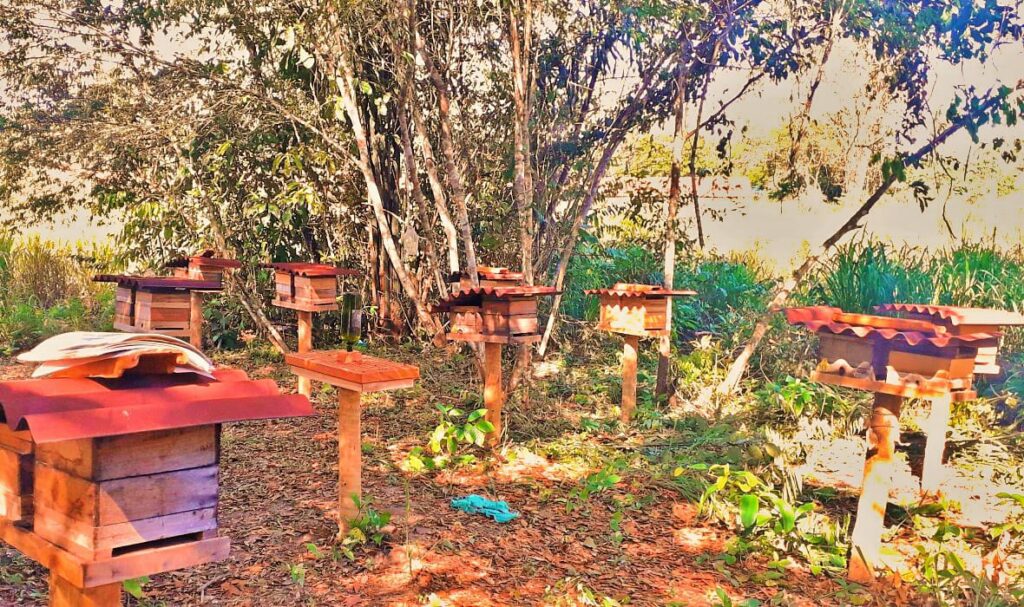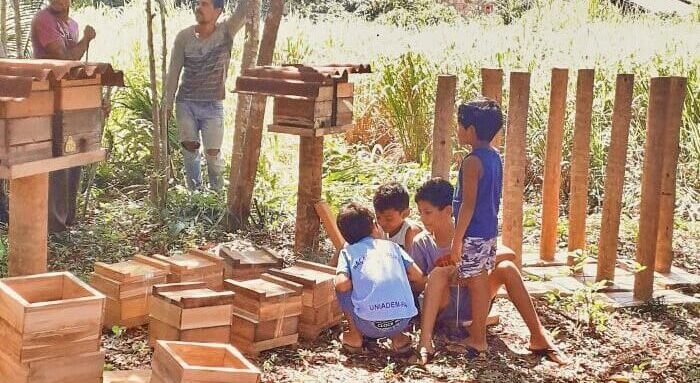Stingless bees are essential species for the preservation of the Amazon forest and a viable source of income for local producers. Get to know some characteristics of this activity.
Author: Daniela Ribeiro
Leia em português | Auf deutsch lesen
The great importance that bees have for planet Earth is widely known due to their major contribution to pollination, enabling both the succession of plant species and as a source of food for animals and humans. And within this large group, there are native stingless bees, known by this term thanks to their atrophied sting which prevents them from stinging. They are widely distributed in tropical regions of the planet, e.g. in Brazil, which has a wide diversity of native bees.
They are also known as Indigenous bees due to Indigenous people’s customs of keeping the animals and using the resources obtained from them, especially honey, as a food source and more frequently for therapeutical purposes. However, nowadays the keeping of stingless bees is not an activity restricted to Indigenous people; over the years, Indigenous bees have been gaining prominence, their rational breeding practices being established by several groups of people as an activity called meliponiculture.
There are numerous benefits associated with meliponiculture, such as the strengthening and promotion of environmental protection, since rational breeding reduces the exploitative practices that consist in destroying existing nests in nature for the extraction of honey, a practice that can endanger the existence of many species.

In contrast to exploitative activities, rational breeding consolidates the conservation of species through the acquired knowledge of each one of them, and their reproduction ensures the presence of these individual animals in the environment so that they can also fulfil their environmental functions, such as pollination. In addition to the environmental benefits, there are also economic benefits for those who breed them, known as meliponiculturists. The activity provides breeders with financial gain through the marketing of products derived from beekeeping, such as honey, a product distinct from the honey of Africanised bees and different between each native bee species, which is the most interesting resource for producers, although other products such as pollen and wax could also be marketed.
There is a significant difference between honey from native bees and honey from bees with stings, not only in terms of physicochemical properties, but also in terms of production volume, which is relatively low in meliponiculture. However, due to the quality of honey from stingless bees and its great therapeutic benefits, which have been extensively researched, this product has a higher economic value than Apis mellifera honey and is even considered a gourmet honey, used not only for medicinal purposes but also in cooking, thus expanding the potential opportunities for marketing the honey obtained from this activity.
There is also the possibility of making a financial profit by selling the hives to other beekeepers or even to people who want to keep them at home as a hobby. It is important to emphasise that the management of stingless bees will vary according to the production objective of the beekeeper, whether it is honey production or propagation, as the correct management for each purpose will increase production with greater certainty of success in the activity.
The choice of species to keep should be carefully considered. In Brazil, there is a great diversity of species, some of which are only found in certain regions to which they are adapted. Therefore, when purchasing a species, it is recommended to choose one that is already present in the region, as it is already adapted to the environment, rather than importing species from other regions, which usually do not adapt or do not have the same productive potential, as they lack the ideal environmental conditions.
Meliponiculture is an activity that provides great benefits, but it still needs to be strengthened through studies, regularisation, and technical support for meliponiculturists. It is also an excellent tool for environmental education, since the future and sustainability of our planet depend to a great extent on these small creatures which, despite their size, are giants in terms of what they do for humanity.
Your donation can have a positive impact on the world!
Subscribe to receive our Newsletter!
Find us also at Linkedin, Facebook, Twitter or Instagram
www.meli-bees.org
❤️


2 Replies to “Meliponiculture: A Sustainable Production”